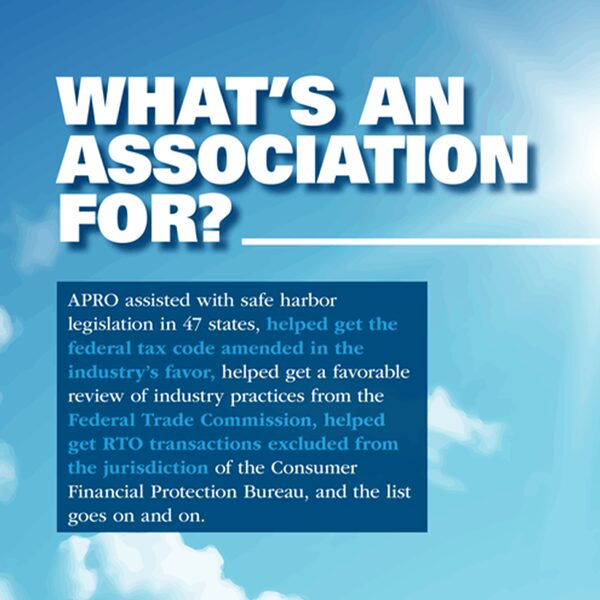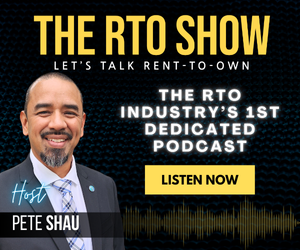APRO assisted with safe harbor legislation in 47 states, helped get the federal tax code amended in the industry’s favor, helped get a favorable review of industry practices from the Federal Trade Commission, helped get RTO transactions excluded from the jurisdiction of the Consumer Financial Protection Bureau, and the list goes on and on.
APRO was founded to give realization to the long-term aspirations of some of the original RTO entrepreneurs. Those early dealers did not know whether their innovation into the retail consumer electronics marketplace would stand the test of time, and some knew theirs was likely to be an uphill struggle to make RTO legal and respected. The Singer Sewing Machine Company had tried offering their machines via RTO transactions in the very early 20th century, but after losing a couple of lawsuits, abandoned the effort. The hire-purchase concept in the countries of the British Commonwealth, offering ownership via rentals was highly regulated from its inception in the late 19th century. It is still at play in Great Britain and elsewhere. It is still highly regulated.
The early RTO dealers in the U.S. thought that they had hit upon a good idea that helped them reach an underserved segment of the market. Consumers liked the transaction. Consumer advocates hated it. Some of those early dealers understood that if their companies were to thrive and grow, they would need the underpinnings of a legally recognized transaction that covered everyone in the business, and that only by joining forces with other dealers did they stand much of a chance of success. They created APRO as their army, and determined that the RTO idea was so novel, so important, so useful as a consumer transaction that it was worth the fight, no matter the final outcome.
Nearly 40 years later, the evidence is in. The dealers prevailed against those who wanted RTO outlawed and the RTO transaction today is commonplace in many areas of American commerce and reaches far beyond its original conception of getting consumer electronics into the hands of cash and credit-constrained consumers. Early on, association members believed that RTO is a good idea and adds value in the marketplace giving consumers choices they otherwise might not have. Dealers still believe that today.
This article will not chronicle the legal and political battles the association has fought over the years. An anecdote from the early days will perhaps suffice to explain why your trade association has proven itself time and again as vital to your continued existence as a profitable rental dealer in America.
Today, you are living, most of you, in legally untroubled times. Competitive times, to be sure, but no group with the power of government behind it is trying to put you out of business.
It was not always thus. Will the currently calm waters of RTO ever roil again with legal or political challenges? Who can say? The reason that trade associations, generally, and APRO in particular, exist is to insure the industry is ready should such eventualities ever recur.
The year was 1981 and the U.S. Congress was in the process of “simplifying” Truth In Lending (TILA), as if the federal government has ever simplified anything. In addition to amending the statute, the Federal Reserve Board (FRB) was charged with revising Regulation Z, the interpretive regulation detailing how TILA was to be implemented. From the original enactment of TILA in 1968, the FRB was the regulatory body charged with the duty to flesh out and explain in its regulation the complicated world of consumer finance.
One of the areas that needed clarification was the relationship between the federal law and the fledgling RTO industry. RTO barely existed in 1968, but as the business grew, it attracted the attention of legal aid lawyers and consumer advocates, because their clients were increasingly availing themselves of the transaction in order to enjoy the benefits of modern technology, mainly TV’s at the time, and later VCR’s.
Legal aid lawyers had been suing RTO companies, arguing that the transactions were credit sales under TILA with mixed results. The statute, as originally written should have been clear, but wasn’t. The original wording of Regulation Z did nothing to clarify the issue. Under the federal law, some leases, to be sure, are indeed credit sales. As it happened, almost as soon as APRO came into existence in 1981 with its first office in Austin, Texas, and a skeleton staff of one and then two, the FRB staff attorneys somehow uncovered the existence of the association, the self-declared voice of RTO, and called. They were interested in learning exactly how RTO worked and in the course of those conversations determined that it would be useful to spend some time in some RTO stores to get a better understanding of how the transaction worked and how customers felt about it.
Now at this early moment in the life of the RTO industry, there were, as is perhaps understandable, some dealers who were less than committed to any long-term existence in RTO and, rather, were in it for the quick kill. They figured what they were doing—charging twice the cash price for TVs—could not possibly be legal, and so they intended to do business until they got run out of town. Among other strategies, they separately incorporated every store, when they opened more than one, so that if one store got hammered in a lawsuit, they could just shut it down and the other stores would keep the cash flowing. They may have been greedy in excess, this group of dealers, but some of them were clever business people, adroit at exploiting what they perceived to be loopholes in the legal system.
The FRB staff assigned to research RTO and ultimately report their finding back to the full Board, wanted to visit stores in the D.C. area. There were several to choose from. One of the forthright, above-board, ethical RTO dealers with stores in Maryland, was Tracey Morgan who owned Odyssey Leasing. She was, incidentally, one of the early female pioneers in RTO and was one of the original 40 APRO members. APRO was ultimately able to work with Tracey and FRB staff to set up appointments in several of her stores with Tracey in attendance to answer questions and explain business practices.
Alongside Tracey in some of the Maryland markets was Sam Wolf’s company, Action TV Rental, Inc., which at the time of the FRB inquiry was being sued by the Maryland Attorney General for violations of the state RISA statue, the state deceptive trade practices statute and the state debt collection statute. The courts ultimately found 64 separate deceptive trade practice violations, and fined the company and principals as well as issuing an injunction against further violations of state law. When the principals continued to violate the law, the attorney general got a permanent injunction against the named principals from doing business ever again in the state of Maryland. At one point, Wolf bragged in court about the practice of the “one-way switch out,” where the company told the customer the TV on rent was being recalled and that the customer would be given a loaner while the rental unit was being serviced. Then store employees would go to the house, load up the TV and drive off. Wolf explained that the practice reduced the level of confrontation and the risk of violence when picking up on past due accounts.
The dealers who founded APRO knew there were these kinds of dealers in the marketplace and knew that their existence threatened the existence of the entire industry. Early APRO meetings were replete of tales of bad conduct by the actors. It is why the APRO founders thought it important to create a trade association that could extol RTO best practices and otherwise explain and defend the transaction.
Had the FRB staff not contacted APRO and, instead, simply gone to the Yellow Pages for their research, they would have come across Action before Odyssey. Had they conducted their store visits in the Action stores instead of Odyssey stores, they would almost certainly have gotten a different impression of RTO than the one Ms. Morgan was able to convey.
“Ah, but a man’s reach should exceed his grasp or what’s a heaven for?”
—Andrea del Sarto, a poem by Robert Browning (1812-1889)
The result of those store visits and the extensive conversations with APRO staff was that the FRB staffers ultimately concluded that RTO transactions were, in fact, leases and not credit sales and therefore should not be covered by TILA. That conclusion found its way into Regulation Z with the addition of a 10-word parenthetical added to the definition of “credit sale” in the regulation. Those words were added in 1982 in the aftermath of the TILA simplification project. Those 10 words, which are still in the regulation, are “A lease is a credit sale…(unless terminable without penalty at any time by the consumer)…”
Thus began the important work of APRO on behalf of the industry it was created to represent.
There is a current movement in U.S. academic circles either to rewrite history or erase it because it is too white, too capitalist, too male, and too violent to suit the prevailing progressive zeitgeist of how the world ought to be. It is a dangerous trend whose outcome, if not curbed, is likely to be disastrous. Other cultures have tried to erase their histories with censorship, book burning and the like. All have failed, in part at least because of this practice.
RTO is but a sliver of the American economy. Nonetheless, its participants, particularly, need to know the industry’s history. Calm waters can roil at the most unlikely of times.
Of course, those of you who have been around for a while, know that APRO’s good work on your behalf did not end with fixing the TILA problem. APRO has since assisted with safe harbor legislation in 47 states, helped get the federal tax code amended in the industry’s favor, helped get a favorable review of industry practices from the Federal Trade Commission, helped get RTO transactions excluded from the jurisdiction of the Consumer Financial Protection Bureau, and the list goes on and on. APRO has worked nearly 40 years to help make the industry better. APRO has always wanted the RTO industry to be as good as it possibly can be. That is what Mr. Browning was talking about.
There are, as there ever have been, some few free-loading rental dealers out there who have chosen not to help protect their industry by being members. They have been content to let others bear the expense and burden. All we can finally say to them is “Shame on you,” with a reminder that it is never too late to come to the table.
Ed Winn III serves as APRO General Counsel. For legal advice, members in good standing can email legal@rtohq.org.










